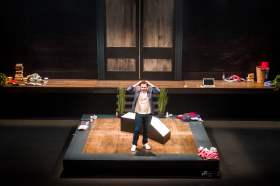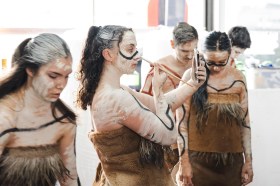Following the #MeToo movement, the entertainment sector has seen an uptake in intimacy coordination for performers on stage and screen. The MEAA’s Intimacy Guidelines for Stage and Screen provide a vital resource and have been endorsed by Screen Producers Australia, the Australian Directors’ Guild and the Casting Guild of Australia, among many others.
This has been a positive first step towards committing to safe workplaces for creative professionals but, for long-term change, it’s vital to create a cultural shift around consent.
‘There is a particular challenge in the performing arts because it’s an industry where people are expected to simulate relationships and simulate sexuality as part of the job,’ says Bayley Turner, a consent consultant who works with theatre companies on sexual violence prevention and ways to create safe consented workplaces.
She continues: ‘Everyone is trying to navigate their role from both a personal and professional standpoint, and the stakes in the entertainment sector are just so much higher because of job scarcity.’
Turner is a strong advocate for consent in the creative industries, and studied the topic for her masters degree with a research thesis in 2019 that engaged 30 sector workers (including six ex-creative industry workers).
Her research shows that consent is often defined differently in people’s personal lives than it is in their creative work, and whether verbal consent is required also changes depending on context. This blur of personal boundaries is a factor of risk that furthers existing power dynamics – and can be compounded by the pressure to adjust those boundaries for a particular work.
She continues: ‘A lot of the work that I’ve been doing is not just focused on consent, but on culture. It’s not just during a scene that there is risk [of sexually discriminatory behaviour]. It’s at the costume fitting, at private discussions, in the audition room, at the after party and so forth. I would say these points of risk are even more critical than what happens on the stage, because there is more avoidance to respond when it’s the culture that needs shifting.
‘We never want change in our sector to only be as a result of violence,’ says Turner. ‘We want to be proactive, not responsive, and the whole objective is to make our industry safer before someone suffers.’
Read: How much has #MeToo achieved for safer arts workplaces?
Creating a safe culture of consent for the whole crew
Turner adds that creating a safe, consensual space is not just for the actors on stage, but extends to everyone from the director to the lighting designer.
It’s about creating a culture that is good at communicating these issues, and having conflict response skills and structures of support. Turner says: ‘Intimacy coordination is a really powerful tactic, but it’s only as strong as the culture that it exists in… An intimacy director is so much more empowered to do their job properly if the room is primed for them, because it’s already a consent-based practice.’
Now tasking herself with this job locally, Turner ran extensive pilot programs with the theatre and performing arts membership organisation UK Theatre before bringing her expertise back to Australia. Increasingly, Turner is seeing theatre companies approach her to work with not only the creative team, but also front and back of house staff – people who haven’t been as visible in the #MeToo movement.
Consent between performers and audience members is also shifting, especially in light of COVID-19, which changed not only how we experience performances, but also theatre etiquette that sets in place frameworks around interaction. Marketing and publicity teams can often help communicate these terms of consent to the general public, says Turner.
She adds: ‘Every production schedule is different, but I think the best results are when I’m coming in to work with the production team as early as possible, with various touch points throughout. Even just the very presence of having someone in that role is a sign for creators that there is a consideration of safety on [a] project.’
Further, while the performing arts is an important and particular space for discussions around consent, Turner says the work being done can be transferred to all creative industries. It’s about improving work conditions for writers, designers, media, event planners, gaming industries and more.
Power in education
Turner’s thesis, ‘Consent in the Creative Industries’, included an important discussion on initial encounters with power, as often these are experienced right when performers are beginning their training.
So much of a performer’s education is about pushing boundaries and challenging their limits. Turner says: ‘Formal entrants described a component of tertiary training being a needful breaking down of personal boundaries, arguably normalising breaches of consent.’
One research participant noted that ‘the underlying assumption was: you’re here to push your boundaries and stretch yourself and, if you don’t, that means you’re not a good artist…’
Many reflected that when they underwent their training, consent, or the lack thereof, was never discussed. While this may have changed in recent times, shifts in attitude at the institutional level will be ‘pivotal to generational industry change’, says Turner.
She tells ArtsHub: ‘Consent education is really a huge benefit to all. My work is always trauma-informed, strengths-based and essentially feminist. It’s there to create an agenda of equity that is for everyone.
‘This process is about changing consent from this complicated idea into an actual practical process. Once everyone has access to that process, it reduces conflict, because everyone is on the same page and knows what is expected of them to address challenges in the room.’
Instead of policing or punishing bad behaviour, Turner says this cultural shift is what will really drive generational change. ‘[Because] once you find that you have the rights and safety in one area, it casts a light on the whole environment and you can see where the shadows still exist,’ she concludes.
For confidential information, counselling and support, call the national domestic, family and sexual violence counselling, information and support service helpline on 1800 010 120 or the Support Act Wellbeing Helpline on 1800 959 500 for anyone who works in the arts.





